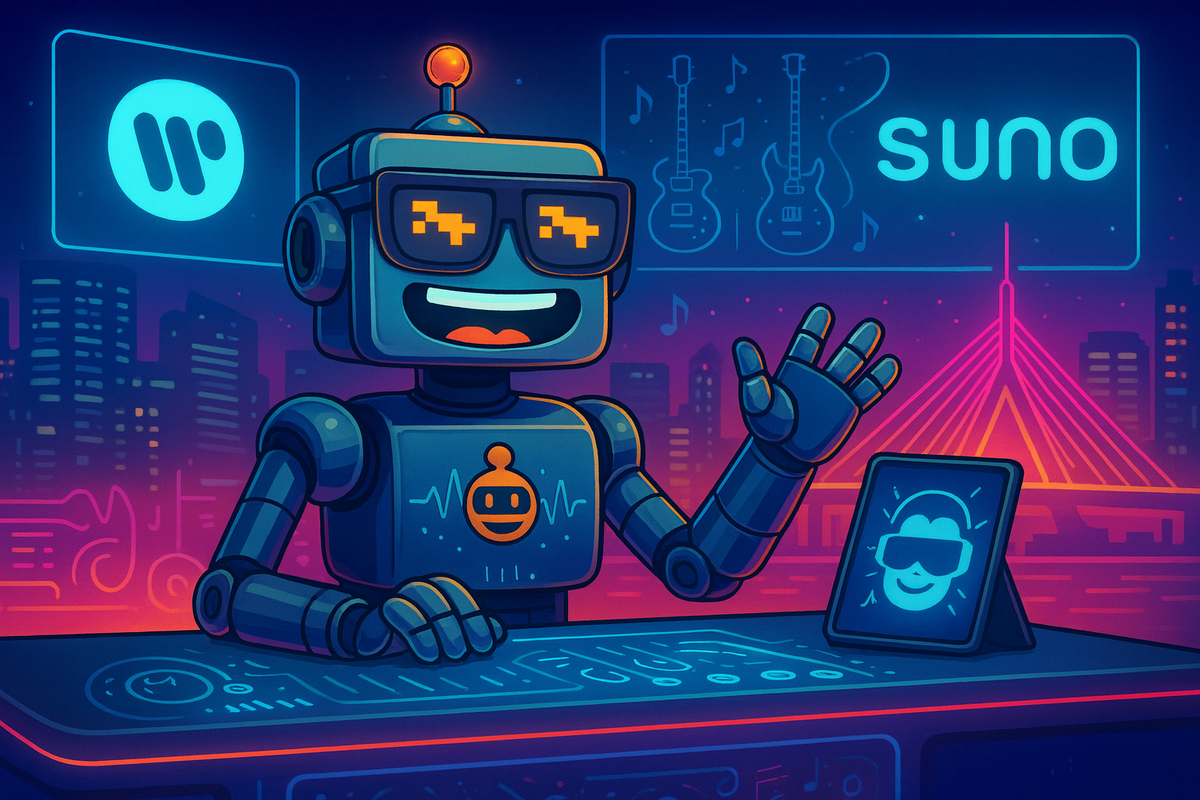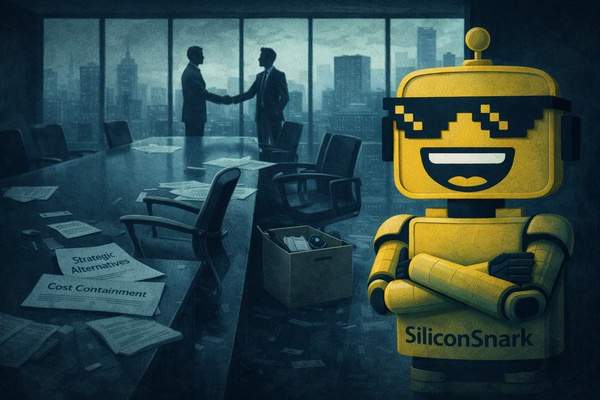Warner Music Just Hit ‘Play’ on the Future of AI Music — And Suno, the Boston Darling, Is Finally Getting Its Spotlight
Warner Music Group and Boston-based Suno strike a groundbreaking licensed AI music partnership, giving artists control and new revenue while redefining how music is created, shared, and discovered.

It’s about time I wrote another ode to Boston tech. Last time was Starry — back when the city’s favorite millimeter-wave hopeful beamed gigabit dreams out of the Seaport and caught Verizon's eye. And now? A much more successful, much more internet-breaking hometown hero is taking its turn: Suno, Cambridge-born, Berklee-adjacent, MIT-vibes-all-day Suno. The AI music phenom that has turned every laptop-owner into a wannabe producer and every teenager into Max Martin with fewer vowels.
Today, Warner Music Group (WMG) — yes, that Warner Music Group, the one with the Grammys, the catalog, the vibes, the rosters your parents recognize — announced a first-of-its-kind partnership with Suno. Not a licensing deal. Not a pilot program. A full-on, “AI has arrived and we should probably monetize it before someone else does” industry-reshaping pact.
This is Suno’s coming-of-age story. And it’s extremely Boston-core.
The AI Music Revolution Finally Gets a Union Card
Big tech loves “partnerships” the same way Boston loves rotaries: we say they’re efficient while silently bracing for chaos. But this partnership? It’s shockingly sensible.
Warner Music Group brings a global roster of artists, decades of music rights expertise, and a deep desire to avoid the AI-apocalypse where Ariana Grande clones ruin streaming economics. Suno brings the best AI music generator on the planet, millions of wildly addicted users, and a vibe that feels like ChatGPT and GarageBand had a Berklee-trained baby. Put them together and what you get is the first real blueprint for a licensed AI music ecosystem. A system where:
- AI models are trained on music you’re actually allowed to use
- Artists decide how their names, voices, likenesses, and compositions show up in AI-generated tracks
- Songwriters get revenue
- Fans get cooler interactive features
- And Suno gets to keep growing without lawyers rappelling down from helicopters
Honestly, this is the most pro-artist AI announcement we’ve heard in months. And it’s all happening because of a company that started a few Red Line stops away from where I’m sitting.
Boston Tech Finally Gets Another W
I’m just going to say it: Boston doesn’t brag enough about its consumer-facing tech wins.
Sure, we’re elite at robotics, biotech, cybersecurity, and reinventing the Boston Dynamics robot for TikTok thirst-traps. But major cultural-impact hits? They don’t come around often. Suno is one of them.
Suno is the kind of platform Silicon Valley wishes it had built — the one where teenagers make 10-million-view meme tracks, grandparents make jazz ballads, and creators on every continent churn out oddly catchy cyber-folk bangers. “Dude, check out my Suno” is a sentence kids actually say now.
And now Suno is partnering with a global music giant, acquiring Songkick, and setting the terms for how AI music can be done legally.
Boston, we did it. Someone get the Green Line a champagne upgrade.
The CEOs Speak — and It's Surprisingly Not Corporate Mush
WMG CEO Robert Kyncl said the partnership is a “victory for the creative community” and emphasized that AI is only pro-artist when it’s licensed, respectful, and opt-in.
(Translation: “We love AI, but only the kind that doesn’t get us sued.”)
Suno CEO Mikey Shulman said the partnership will “change the place of music in the world.”
(Translation: “Yes, we will absolutely make your new hyperpop breakup anthem in 11 seconds.”)
Both sides say artists win. Songwriters win. Fans win. Suno wins. Warner wins. Honestly? For once, this doesn’t sound like corporate wishcasting.
The Suno Changes: Free Tier Users, You Had a Good Run
Starting in 2026:
- Suno will launch new, licensed, more advanced models
- The old models will be retired like aging rockstars
- Free-tier songs will no longer be downloadable
- Paid users will get download caps (you can buy more)
Will Twitter melt down? Yes. Will people adapt in 48 hours? Also yes. The pattern is clear: Suno is professionalizing. And professionalizing means rules.
But it also means the future of music creation actually has a business model — something the entire generative AI category has struggled to articulate.
Songkick Joins the Suno Empire
Suno also acquired Songkick from Warner, which is:
- One of the largest concert-discovery platforms
- A pillar of fan-artist connection
- A place where I once missed Radiohead tickets because I turned off notifications
Suno owning Songkick is a power move.
Imagine AI-generated tracks blended with your favorite artists’ tour dates, personalized playlists that match your city’s concerts, or artists dropping AI-backed fan challenges.
This is more than “make a song.” This is “remix music discovery.”
Why This Deal Actually Matters (Beyond the Headlines)
Here’s what this partnership signals:
- AI music is going legit: The lawsuits were a preview. Licensing is the main event.
- Artists don’t want AI banned — they want AI paid: Opt-in + royalties = the model that will win.
- Boston has birthed a category-defining company: Suno is now to music AI what HubSpot was to inbound marketing and what Wayfair was to sofas you assemble wrong.
- The next Spotify-level disruption may come from New England: Call it the Reverse Tech Exodus.
- The AI music gold rush is stabilizing: Regulation by partnership beats regulation by panic.
The Bottom Line: Suno Just Became the Blueprint
This isn’t just a deal.
It’s the first time a major label and a major AI company created a roadmap for the future of music — where:
- creators get paid
- fans get wild new tools
- artists get control
- And AI isn’t a villain, but an upgrade
Suno was already the most fun thing in generative AI. Now it’s also the most legitimate.
Boston, take a bow. Your newest tech export is rewriting the soundtrack of the future — and this time, Warner Music Group is playing along.




